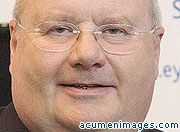MPs have criticised an “utterly preposterous” High Court ruling that says it is illegal to say prayers as a ‘formal’ part of local council meetings.
Eric Pickles, the Communities Secretary, disputed the basis of the ruling and said that the “right to worship is a fundamental and hard fought British liberty”.
Chris Bryant, the Labour MP for Rhondda, branded the ruling as “utterly preposterous”, and said that he would “consider” tabling a bill to oppose the ruling himself.
Spoil
Conservative MP Tim Loughton said: “If you don’t like prayers at council meetings don’t go to them – simples. But don’t spoil it for the majority who do appreciate it”.
Fellow Tory David Jones said that he would “not be surprised” if the ruling led to a challenge to the practice of saying prayers in Parliament.
And the Bishop of Exeter, the Right Reverend Michael Langrish, said: “I think it’s a great pity that a tiny minority are seeking to ban the majority, many of whom find prayers very, very helpful, from continuing with a process in which no-one actually has to participate.”
Earlier this morning the High Court ruled that the saying of prayers as a ‘formal’ part of local council meetings was unlawful.
Logically
The judge said: “The saying of prayers as part of the formal meeting of a Council is not lawful under s111 of the Local Government Act 1972, and there is no statutory power permitting the practice to continue.”
But Mr Pickles disputed this assertion on his Twitter feed saying that the “Localism Act gives councils power of general competence, logically this includes ability to pray before meetings.”
The practice of saying prayers at Bideford Town Council meetings is understood to date back to the days of Queen Elizabeth the First. The Council has, recently, twice voted in support of continuing with the prayers.
Liberty
Individual councillors were free to not take part in the prayers if they wished, and the register of attendance was not taken until after the prayers had finished.
Bideford Town Council legal defence was underwritten by the Christian Institute – a national charity that defends religious liberty.
Simon Calvert, a spokesman for The Christian Institute, said: “There is no way that Parliament, when it passed the Local Government Act 40 years ago, intended it to be used to outlaw prayers.
Jubilee
“This case was brought by a campaign group that wants to drive Christianity out of public life, and the High Court has today given them great encouragement to take matters further.
“It is high time Parliament put a stop to this assault upon our national heritage. What’s next? Will prayers at the cenotaph end up in court?
“What about local councils that wish to formally mark the Queen’s Diamond Jubilee as part of their official meeting? Is that now unlawful too?”

